Landscaping professionals offer a diverse range of services to meet client needs. These services may include lawn care, garden leveling, weed management, and irrigation system installation. In addition to fulfilling their contractual obligations, landscapers also foster strong rapport with their clientele.
As a result, it is crucial for these professionals to hone their contract negotiation abilities and have a functional landscaping contract template at their disposal. This contract ensures numerous benefits for both landscapers and their clients.
Table of Contents
What is a landscaping contract?

A landscaping contract is a legally binding agreement between a landscaping professional or company and a client. This document outlines the scope of work, responsibilities, expectations, and terms and conditions for the landscaping services to be provided. The contract typically includes details such as the services to be performed, the timeline for project completion, payment terms, and any specific client requirements. By clearly defining the obligations of both parties, a landscaping contract helps to ensure a smooth working relationship, minimize misunderstandings, and protect the interests of both the landscaper and the client.
Landscaping Contract Templates
Enhance your landscaping business operations with our professional Landscaping Contract Templates. These templates are designed to simplify the process of creating comprehensive contracts for your landscaping services. Whether you provide lawn care, garden maintenance, or landscape design, our templates offer a convenient and legally binding agreement between you and your clients. With customizable sections for project details, scope of work, pricing, and terms and conditions, you can create contracts that accurately reflect the specific services and expectations of each project.
Our printable and editable templates ensure clarity and professionalism in your agreements, protecting both you and your clients. From residential landscaping projects to commercial maintenance contracts, our templates help you establish clear communication and provide a solid foundation for successful partnerships. Elevate your landscaping business with our Landscaping Contract Templates and deliver exceptional services with confidence.
Benefits of a landscaping contract
We’re sharing with you the numerous benefits of having a landscaping contract in place. These advantages not only make life easier for both landscaping professionals and their clients but also promote a healthy and successful working relationship.
Clarity and expectations
A well-drafted landscaping contract ensures that both parties understand the scope of work, project deliverables, and expectations. This eliminates any confusion or misinterpretation, leading to a more efficient and hassle-free experience.
Legal protection
In the unfortunate event of disputes or disagreements, a landscaping contract serves as legal documentation. It protects the rights and interests of both the landscaper and the client, providing a solid foundation for resolving any issues that may arise.
Financial transparency
By outlining payment terms, schedules, and any additional fees or expenses, a landscaping contract ensures financial transparency. This helps to prevent misunderstandings and disputes related to invoicing and payment, fostering trust between the parties.
Timeline management
A landscaping contract typically includes a project timeline, specifying start and end dates or deadlines for specific tasks. This helps both parties manage their time efficiently and ensures that the project stays on track.
Quality assurance
A contract often includes clauses related to quality standards, guarantees, or warranties for the work performed. This provides the client with peace of mind that the landscaping services will meet their expectations, while also motivating the landscaper to deliver top-notch results.
Liability and risk management
Landscaping contracts may include provisions that address liability and risk management, such as insurance requirements or indemnification clauses. These provisions protect both parties from potential legal and financial consequences that could arise due to accidents or damages during the project.
Relationship building
A well-structured contract demonstrates professionalism and commitment to a successful project outcome. This fosters trust and goodwill between the landscaper and client, laying the groundwork for a long-lasting and mutually beneficial working relationship.
Questions to answer when preparing a landscaping contract
Creating a comprehensive landscaping contract can be a challenging task, but referring to a landscaping contract sample can guide you in incorporating the necessary elements. To develop a thorough and personalized contract template, be sure to address the primary questions that define the contract’s foundation. Addressing these questions accurately will facilitate a smooth process, inspired by the landscaping contract sample.
Who is the agreement with?
Begin by determining the identity of the party you are entering into the contract with. This could be an individual or a corporate entity, such as a homeowner with multiple properties, a landlord, a property manager, or a real estate developer. Identifying the client will help you establish the appropriate terms for your landscaping contract.
What is the agreement about?
Define the specific scope of work that the client expects from you. Avoid general statements like “lawn care” or “garden maintenance” and instead, provide detailed descriptions like “weed removal,” “grass trimming,” “pest control,” and “hedge trimming.” Ensure that the terms and conditions are explicit, addressing potential scenarios if either party fails to meet their obligations. Pay close attention to even the smallest details when answering this question.
When will the work take place?
Establishing the start date of the contract is crucial for effective scheduling and planning. Knowing the commencement date and time allows you to organize your workload efficiently, avoiding conflicts or overbooking, particularly if you have limited resources or workforce.
Where is the work to be done?
Determine the specific location of the project, which will help you plan and prepare the necessary equipment. Understanding the work site will also give you an idea of the project’s size and scope, whether it is a small garden or a larger space.
How will the work be carried out?
Outline the procedures and processes to be followed from the beginning to the end of the project. Include information on the services to be provided, the expectations of each party, any required approvals, and payment terms. Clarifying these aspects will ensure a well-defined and well-executed project, keeping both parties informed and satisfied.
Essential Components of a Comprehensive Landscaping Agreement
A landscaping contract should be comprehensive and detailed to ensure that both parties understand their respective responsibilities, expectations, and terms. Here is a guide on what should be included in a landscaping contract:
Parties involved: Clearly identify the landscaping company or professional and the client (individual, homeowner, property manager, or corporate entity). Include full names, contact information, and addresses to establish the parties entering into the contract.
Scope of work: Provide a detailed description of the services to be provided. Be specific about the tasks, such as lawn mowing, weed removal, garden leveling, irrigation installation, tree trimming, and any other services agreed upon. It is essential to be as detailed as possible to avoid confusion or misunderstandings.
Timeline and schedule: Specify the start and end dates of the project, or if the contract is ongoing, include the frequency of service (e.g., weekly, bi-weekly, monthly). Also, mention any milestones or deadlines for specific tasks if applicable.
Payment terms: Outline the payment structure, including the total cost of the project, payment schedule, acceptable payment methods, and any late payment penalties. Be transparent about additional fees or expenses that may arise during the project.
Materials and equipment: Specify who will be responsible for providing the necessary materials, tools, and equipment for the project. If the landscaper is expected to supply these, include an itemized list of materials and their associated costs.
Quality standards: Define the quality standards and expectations for the work performed. You may also include guarantees, warranties, or maintenance periods to ensure the client is satisfied with the final result.
Licenses and permits: Indicate who will be responsible for obtaining any required licenses or permits for the project. Ensure that the landscaping professional has the necessary certifications and qualifications to perform the work.
Insurance and liability: Address liability and risk management by including provisions for insurance coverage, indemnification clauses, and any safety requirements.
Change orders and modifications: Include a clause explaining the process for handling changes to the scope of work or project specifications. Specify how change orders will be documented, approved, and incorporated into the contract.
Termination or cancellation: Detail the conditions under which either party can terminate or cancel the contract. Specify any notice periods, penalties, or refund policies associated with termination.
Dispute resolution: Outline the steps to be taken in case of a dispute or disagreement between the parties. This may include negotiation, mediation, or arbitration, before resorting to legal action.
Governing law: Indicate the jurisdiction and governing law that will apply to the contract in case of disputes or legal issues.
Signatures: Ensure that both parties sign and date the contract, acknowledging their agreement to the terms and conditions outlined.
How to Write a Landscaping Contract: A Step-by-Step Guide
A landscaping contract is essential for ensuring a smooth working relationship between a landscaping professional or company and their client. It clearly outlines the scope of work, responsibilities, expectations, and terms of the agreement, minimizing misunderstandings and protecting both parties’ interests. This step-by-step guide will walk you through the process of creating a professional and comprehensive landscaping contract.
Step 1: Gather Client Information
Begin by collecting the necessary information about the client. This includes their full name, contact details, and address. If the client is a corporate entity, make sure to include the company’s name and representative’s information.
Step 2: Define the Scope of Work
Provide a detailed description of the services to be performed, such as lawn mowing, weed removal, garden leveling, irrigation installation, and any other agreed-upon tasks. Be specific and avoid using general terms to prevent confusion or misunderstandings.
Step 3: Establish a Timeline and Schedule
Determine the project’s start and end dates, and if the contract is ongoing, specify the frequency of service (e.g., weekly, bi-weekly, monthly). Include any milestones or deadlines for specific tasks, if applicable.
Step 4: Outline Payment Terms
Clearly define the payment structure, including the total project cost, payment schedule, acceptable payment methods, and any late payment penalties. Be transparent about additional fees or expenses that may arise during the project.
Step 5: Specify Materials and Equipment
Indicate who is responsible for providing the necessary materials, tools, and equipment for the project. If the landscaper is expected to supply these, include an itemized list of materials and their associated costs.
Step 6: Set Quality Standards
Define the quality standards and expectations for the work performed. You may also include guarantees, warranties, or maintenance periods to ensure the client is satisfied with the final result.
Step 7: Address Licenses and Permits
Clarify who will be responsible for obtaining any required licenses or permits for the project. Ensure that the landscaping professional has the necessary certifications and qualifications to perform the work.
Step 8: Include Insurance and Liability Provisions
Address liability and risk management by including provisions for insurance coverage, indemnification clauses, and any safety requirements.
Step 9: Detail Change Orders and Modifications
Explain the process for handling changes to the scope of work or project specifications. Specify how change orders will be documented, approved, and incorporated into the contract.
Step 10: Outline Termination or Cancellation Clauses
Detail the conditions under which either party can terminate or cancel the contract. Specify any notice periods, penalties, or refund policies associated with termination.
Step 11: Establish Dispute Resolution Procedures
Outline the steps to be taken in case of a dispute or disagreement between the parties. This may include negotiation, mediation, or arbitration before resorting to legal action.
Step 12: Specify Governing Law
Indicate the jurisdiction and governing law that will apply to the contract in case of disputes or legal issues.
Step 13: Review and Finalize the Contract
Carefully review the contract to ensure all necessary details are included and that the terms and conditions are clear and accurate. Make any necessary revisions before presenting the contract to the client.
Step 14: Obtain Signatures
Ensure that both parties sign and date the contract, acknowledging their agreement to the terms and conditions outlined.
Common Mistakes to Avoid When Drafting Your Landscaping Contract
Creating a landscaping contract is essential to ensure a successful project and a smooth working relationship between the landscaper and the client. However, some common mistakes may lead to disputes and costly legal battles. In this article, we outline the mistakes you should avoid when drafting your landscaping contract to ensure a mutually beneficial agreement.
Mistake 1: Omitting Contract Termination Details
Neglecting to include termination procedures in your landscaping contract may lead to losses and misunderstandings. Termination clauses provide clear guidelines on the obligations of each party if the contract is terminated or postponed. Make sure to address termination conditions, notice periods, and any penalties or refunds associated with ending the contract.
Mistake 2: Failing to Specify the Scope of Work
Using generalized descriptions of the scope of work may result in disagreements and additional tasks without compensation. To prevent this, provide a detailed and specific description of the services the client expects from you. If necessary, attach a separate sheet outlining the scope of work to the contract for clarity and reference.
Mistake 3: Not Addressing Contract Modifications
Circumstances may arise that necessitate changes to your landscaping contract, such as additional work or unexpected complications. Failing to include a clause allowing for contract modifications can make it challenging to adjust the terms of the agreement. Refer to a landscaping contract sample to understand how to write a clause that outlines the process for documenting, approving, and incorporating changes to the contract.
Mistake 4: Overlooking Issues Beyond Your Control
Unforeseen events, such as inclement weather or illness, may impact the project’s timeline or execution. Neglecting to account for these factors in your landscaping contract can lead to disputes and potential penalties. Include a force majeure clause to address issues beyond your control, explaining how such events will affect the contract and outlining any potential adjustments to the timeline or compensation.
FAQs
Can a landscaping contract be modified after signing?
Yes, a landscaping contract can be modified after signing if both parties agree to the changes. It’s essential to include a clause in the contract that outlines the process for documenting, approving, and incorporating any modifications to the agreement.
How can I terminate a landscaping contract?
To terminate a landscaping contract, follow the termination procedures outlined in the contract. This typically includes giving notice of termination within a specified period and fulfilling any outstanding obligations or financial responsibilities.
How do I handle disputes arising from a landscaping contract?
In case of disputes or disagreements arising from a landscaping contract, follow the dispute resolution procedures specified in the contract. This may include negotiation, mediation, or arbitration before resorting to legal action.
Can a verbal agreement be considered a landscaping contract?
While verbal agreements can be legally binding, they are challenging to enforce and prove in court. It’s always recommended to have a written landscaping contract that clearly outlines the terms and conditions agreed upon by both parties.
How can I ensure my landscaping contract is legally enforceable?
To ensure your landscaping contract is legally enforceable, make sure it includes all the essential elements, is clear and specific, and is signed and dated by both parties. You may also want to consult with a legal professional to review the contract before signing.
How do I handle additional work requests not covered in the original landscaping contract?
If the client requests additional work not covered in the original contract, you should follow the change order and modification procedures outlined in the agreement. This typically involves negotiating the additional work, documenting the changes, and obtaining written approval from both parties before proceeding.
How can I protect myself from non-payment in a landscaping contract?
To protect yourself from non-payment, ensure your landscaping contract outlines clear payment terms, including payment schedule, payment methods, and any late payment penalties. You can also require an upfront deposit or milestone payments to minimize the risk of non-payment.
Can a client cancel a landscaping contract after the work has started?
A client can cancel a landscaping contract after the work has started if the termination or cancellation clauses in the contract allow for it. These clauses typically specify the conditions, notice periods, and any penalties or refunds associated with contract cancellation.
What is a force majeure clause in a landscaping contract?
A force majeure clause is a provision in a contract that addresses unforeseen events beyond the control of either party, such as natural disasters, severe weather, or other extraordinary circumstances. This clause explains how these events may affect the contract, including potential adjustments to the project timeline or compensation.
How can I ensure that the landscaping contract covers all aspects of the project?
To ensure your landscaping contract covers all aspects of the project, provide a detailed and specific description of the scope of work, materials, and equipment required. Consult with the client to understand their expectations and requirements fully. Review the contract carefully to ensure all necessary details are included and make revisions as needed before signing.









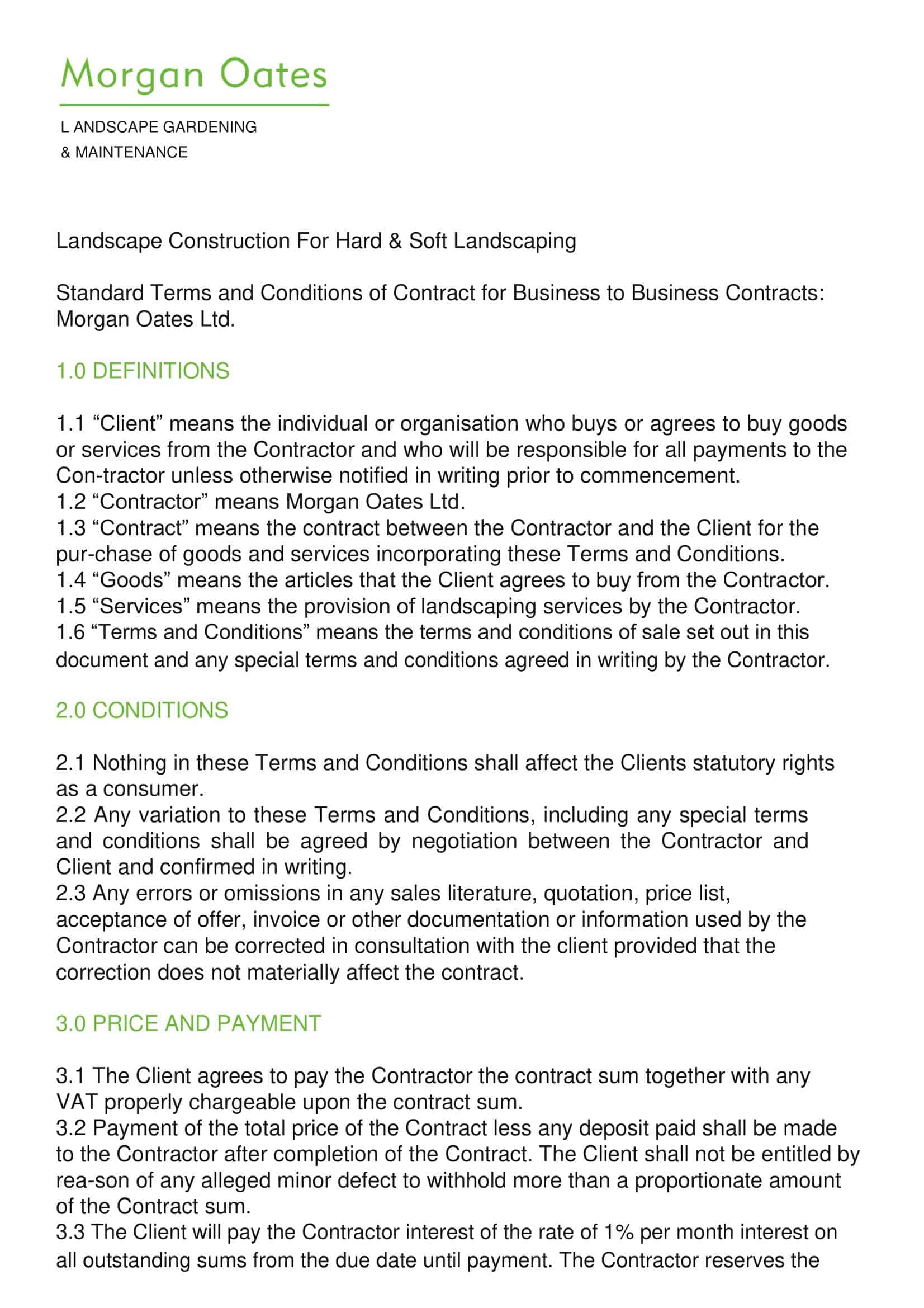









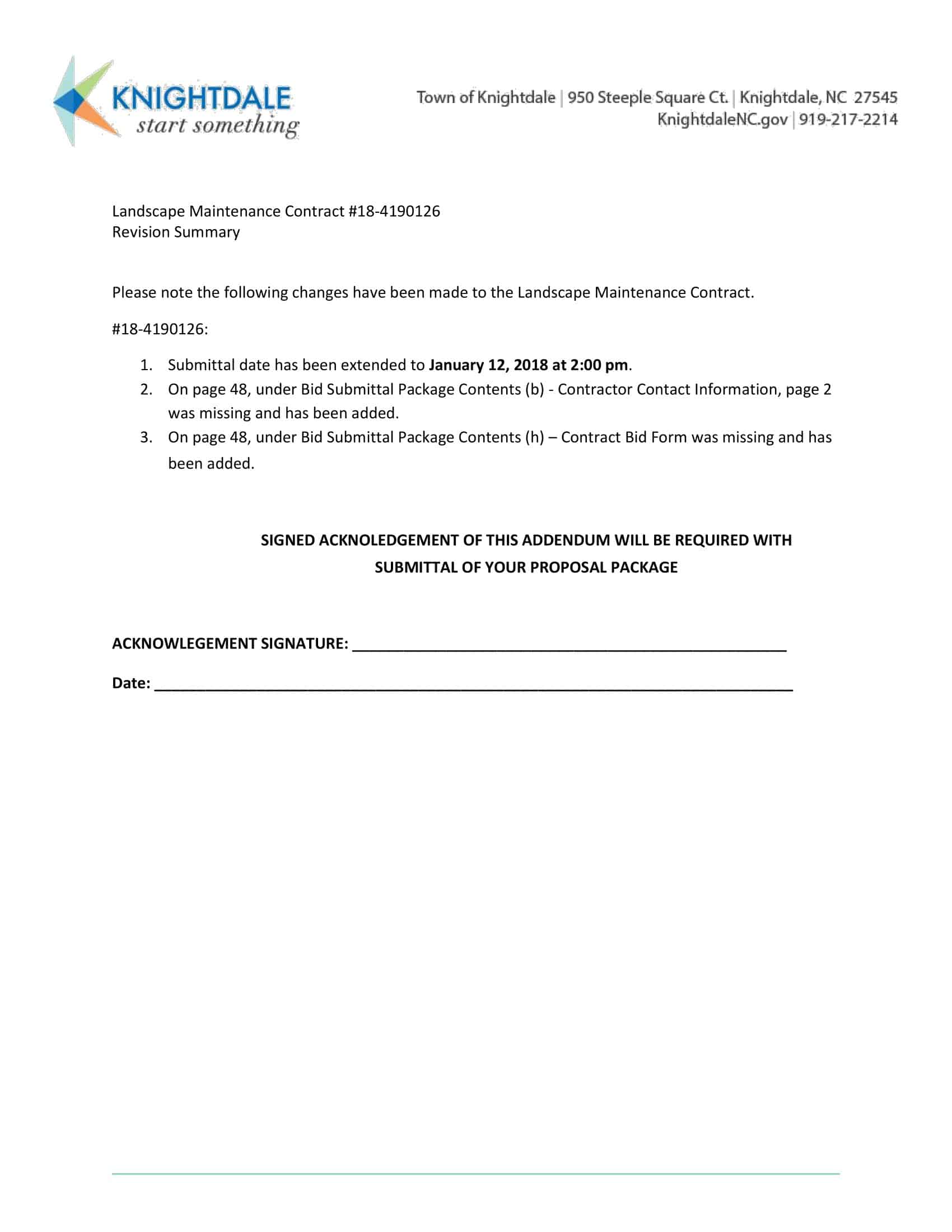





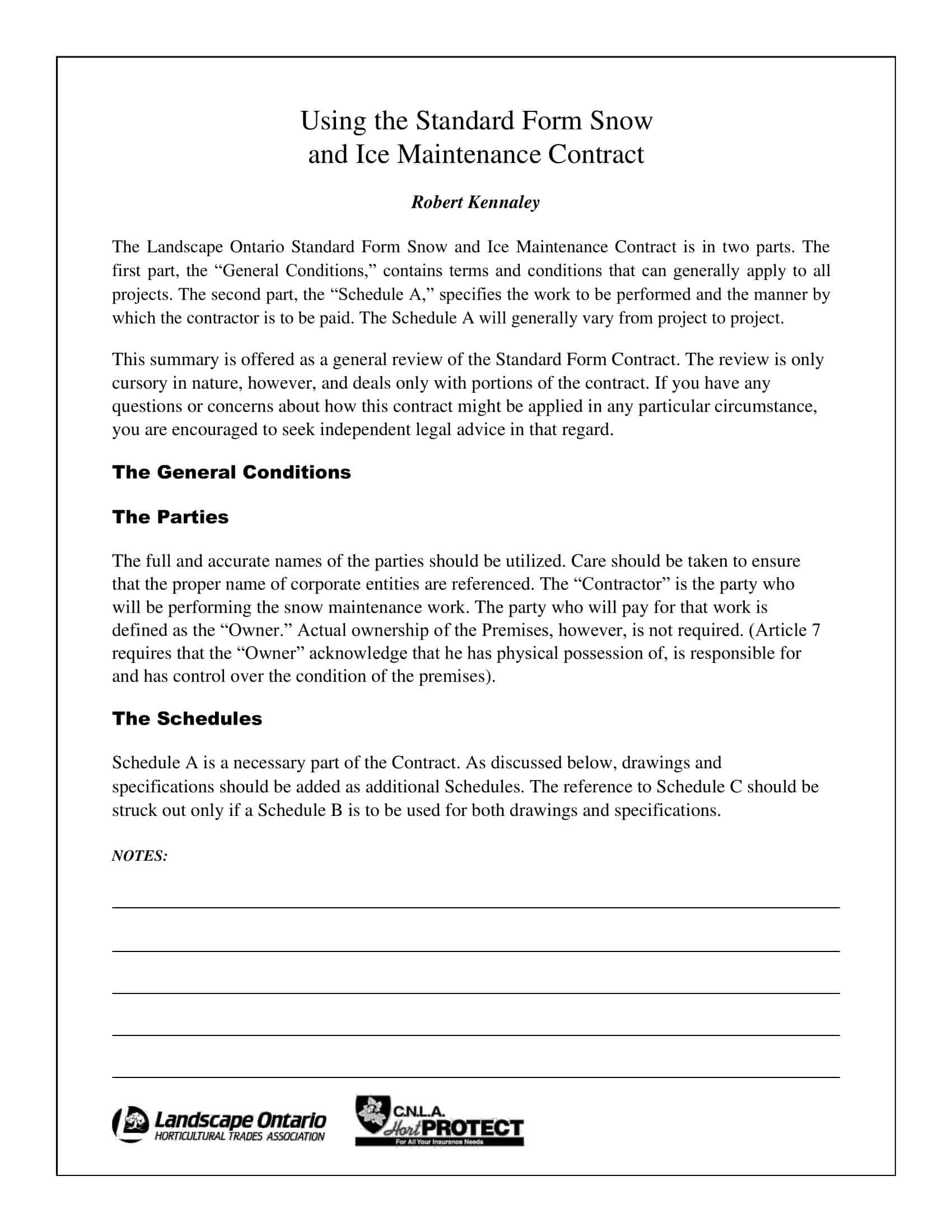





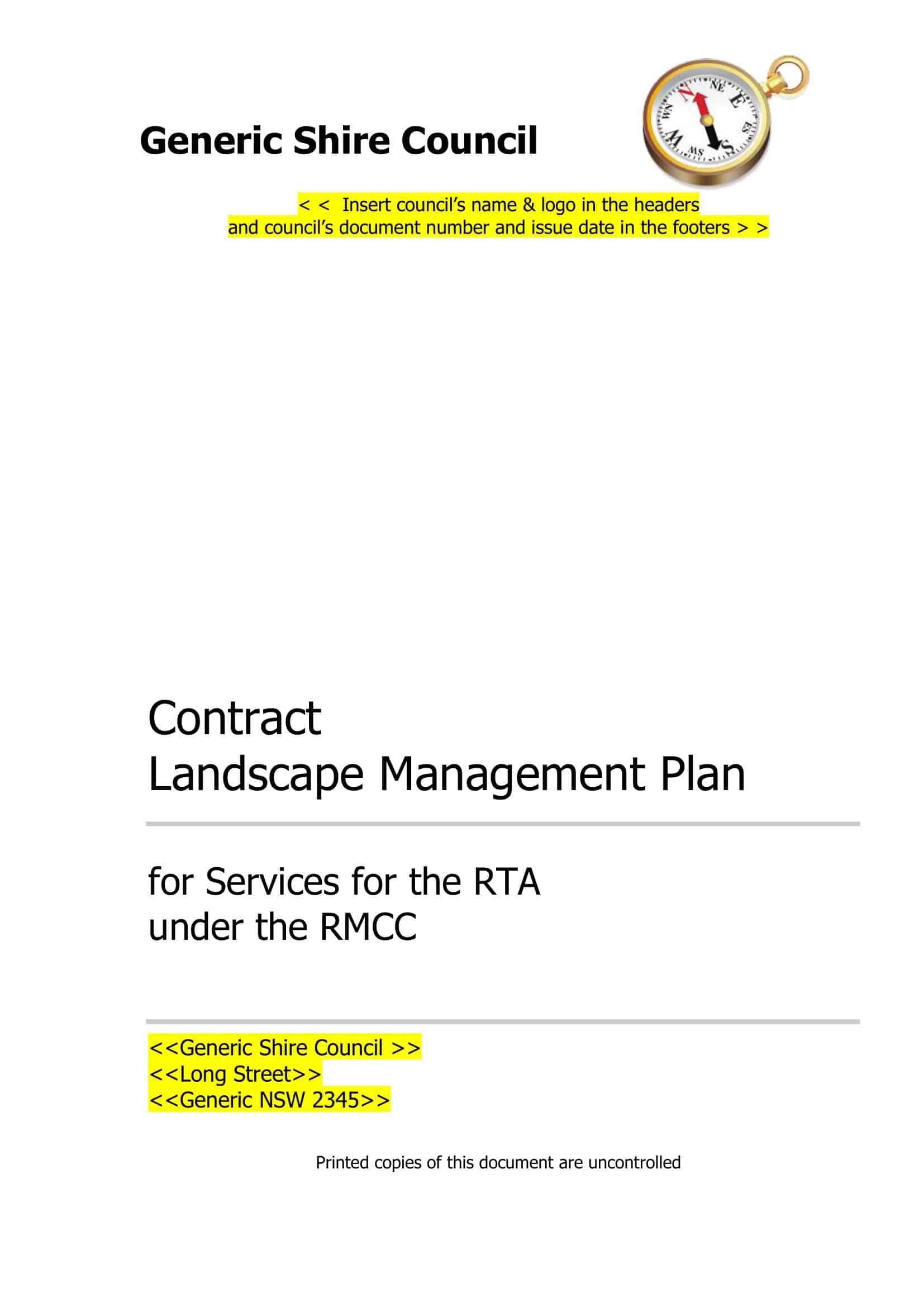


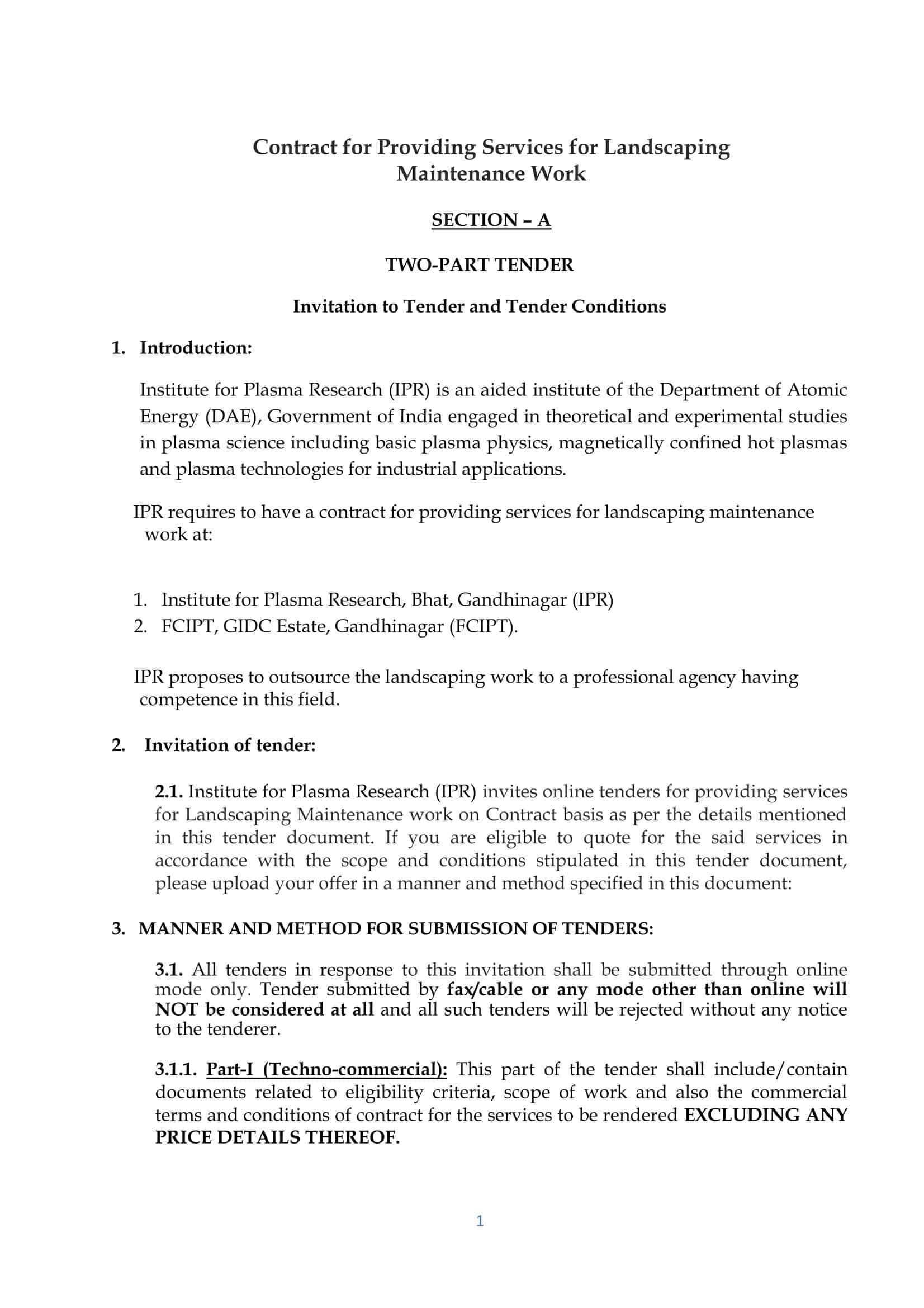









![Free Printable Roommate Agreement Templates [Word, PDF] 1 Roommate Agreement](https://www.typecalendar.com/wp-content/uploads/2023/06/Roommate-Agreement-150x150.jpg)
![Free Printable Credit Card Authorization Form Templates [PDF, Word, Excel] 2 Credit Card Authorization Form](https://www.typecalendar.com/wp-content/uploads/2023/06/Credit-Card-Authorization-Form-150x150.jpg)
![Free Printable Land Contract Templates [Word, PDF] Simple 3 Land Contract](https://www.typecalendar.com/wp-content/uploads/2023/05/Land-Contract-1-150x150.jpg)
